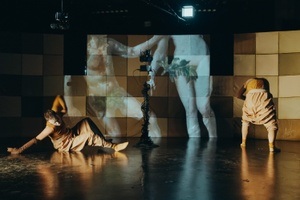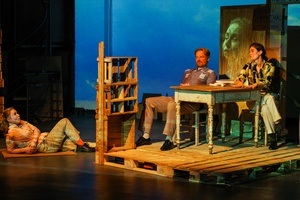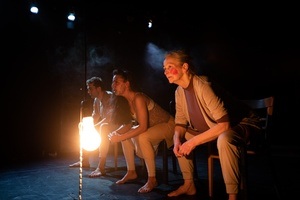INES
In the organizer's words:
A young man, a woman dying of an unexplained illness, characters possessed by strange voices - a love story and the world after a nuclear disaster.
Based on the INES scale, which is used to define incidents in nuclear power plants (International Nuclear and Radiological Event Scale), composer Ondrˇej Adámek and librettist and director Katharina Schmitt develop "INES" in their second joint work, a musical theater piece at the end of the Anthropocene.
O is filled with an irrepressible grief, because his beloved E is dead. He can no longer hear her, no longer remember her face, and would prefer to become a shadow himself.
The Orpheus myth, which with Monteverdi's "L'Orfeo" founded the form of opera itself, at the same time tells one of the most touching love stories of all time - the story of Orpheus, who loses his beloved Eurydice to the realm of shadows, but who succeeds in conquering plants and animals, even the gods, with his song and brings Eurydice out of the underworld. On his way back to the light, Orpheus, despite a prohibition, turns to Eurydice and loses her a second time.
Between absolute silence and deafening noise, atomic winter and heat, dazzling light and absolute darkness, the characters in "INES" sing about human limits and the difficulties of overcoming them. In the process, Ondrˇej Adámek lets us hear how the voice, indeed all human senses, change as a result of the nuclear accident, how O finds his way from a speaking to a singing voice and E disintegrates into the sea of voices in the beyond. The unity of place and time also seems to be dissolved, the lovers separated from each other forever. For while O is in the linear time of the living, E is absorbed in the timelessness of the dead and must watch her body become an immobile and transparent shell.
Conceived as a grand choral opera, "INES" points beyond the principle of the individual, how catastrophes have always directly affected us as a collective, and how themes such as memory, trauma, forgetting and death are constantly repeated.
This content has been machine translated.










